Community Service
1st place: Erie – Garden Talk Podcasts
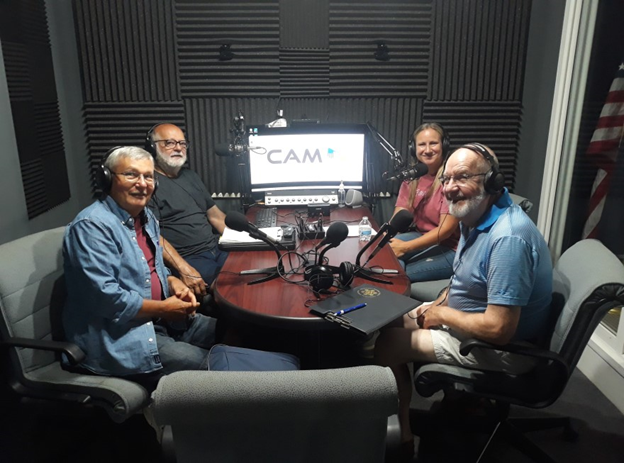
About 6 or 7 years ago, our coordinator (Roberta McCall) was contacted by the owner/operator of FM channel 98.9 in Corry, Pennsylvania, Brian Silvis. Mr. Silvis was interested in the Master Gardeners providing him with short gardening recordings (about 3 to 4 minutes) that he could play over his radio station in Corry, PA, and a nearby sister station in Conneaut. Roberta had been trying to figure out how our Master Gardener group might provide some services to the southern part of our county. Roberta thought this would be a perfect fit to meet that objective. Her repeated requests fell on deaf ears until she wore me down, and I said that I'd look into it. One thing led to another, and before long, I was looking for one of our members to partner with. It eventually dawned on me that the best person would be someone who liked to vegetable garden and was familiar with my quirky ways. Ellen DiPlacido, who worked with me in the Emmaus Garden, was the perfect fit. So I approached Ellen and told her I had a new gig for us. She initially didn't know what to say but eventually said she would try it. After Brian S. loaded a recording program on my laptop, loaned us a microphone, and gave us a few instructions, Ellen and I were in the recording business. We have learned a lot since then--3 to 4 minutes goes quickly, you have to know your material, and it works best if you outline your presentation. Per Brian's request --keep it light, laugh a little, and focus on 3 points to get across to the audience. We learned to do that-- we were partnering with a radio station and doing what we love to do--educating the public about gardening.
2nd place: Erie – Emmaus Grove Garden
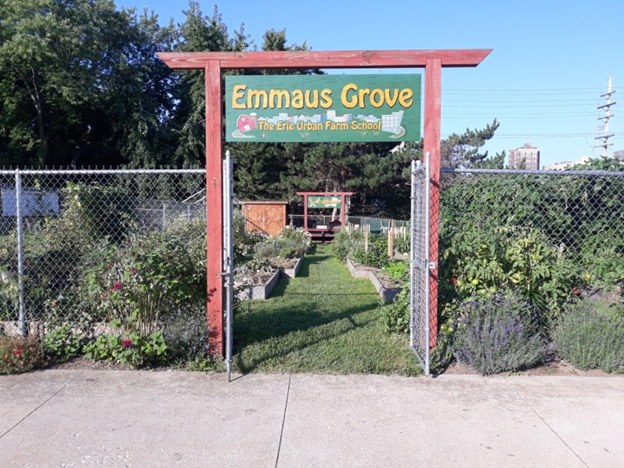
The Emmaus Grove Garden was started by the Benedictine Community's Emmaus Ministries Program in Erie, Pennsylvania, about 16 years ago on a small scale to provide economically disadvantaged families an opportunity to grow some fresh produce to supplement their diets. About ten years ago, a couple of Master Gardener Trainees were recruited to expand the project to provide fresh produce to the Emmaus Ministries Soup Kitchen and Food Pantry. I was recruited a year later when an original member was transferred out of town. At this point, the now Master Gardeners, Ellen DiPlacido and I were asked to help 'grow the garden' to feed the needy of center city Erie who frequented the food kitchen and pantry of their Emmaus Ministries Program. Since that time, other Master Gardeners and community members have joined the team. As the garden entered its second phase of development, it expanded to about 50 raised beds and produced anywhere from 2,000 to 3,000 pounds of produce each season that, in turn, were supplied to the soup kitchen and food pantry. In addition to food production, the garden has served as an educational site for children and adults and has strived to display innovative approaches to gardening, such as vertical gardens, no-till raised beds, and succession gardening so that other center city sites can be as productive as possible. In addition, we have promoted pest and disease control through solid cultural practices and avoidance of synthetic compounds.
3rd place: Delaware – Eye-catching Educational Displays for Delaware County Libraries
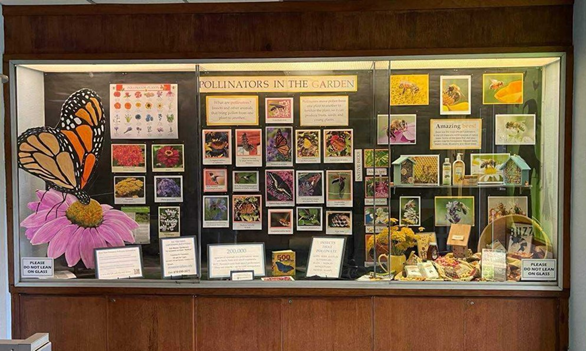
This project is considered a building block to advance and strengthen our ongoing partnership with the Delaware County Library System (26 libraries in 28 locations) towards our mutual goal of serving and educating our socioeconomically diverse community. In 2023, the Penn State Extension Master Gardeners of Delaware County created and placed a variety of displays that appeal to a wide range of library visitors in six libraries. We will continue to expand our outreach by placing similar displays in additional libraries. All educational displays focus on key elements impacting our natural landscape and include photos, concise information, and links to relative Penn State Extension sites.
The subjects:
- "Pollinators in the Garden" What a pollinator is, why pollinators are important, plants that support pollinators.
- "Gardening for Birds" Plants that support birds, why birds are important to the ecosystem.
- "Bees" Bees that may visit a garden, why they are essential.
- "Native Trees and Shrubs" Photos and information for four native trees and four native shrubs that show them at different times of year and the wildlife they support.
- "Frogs, Toads, Salamanders and Snakes" Amphibians and reptiles and their benefits, why they should be encouraged to visit backyard gardens, how to welcome them
- "A Winter Garden" Trees and shrubs that add interest to the winter garden landscape and add color.
Libraries that hosted these displays in 2023:
- Helen Kate Furness Free Library, Wallingford, PA
- Lansdowne Public Library, Lansdowne, PA
- Marple Public Library, Broomall, PA
- Rachel Kohl Community Library, Glen Mills, PA
- Springfield Township Library, Springfield, PA
- Upper Darby Township/ Sellers Library: Municipal Branch, Upper Darby, PA
Target audience: A diverse population of adult and youth visitors of Delaware County Libraries. Both Helen Kate Furness and Springfield Township Libraries conducted talks on two of the subjects we provided: "Bees" and "A Winter Garden," respectively.
Goals: Our primary goal is to expand our outreach and educate our community through our ongoing partnership with the Delaware County Library System, which serves diverse visitors of all ages and socioeconomic backgrounds. This project spotlights key elements that impact the natural landscape and includes good gardening practices, the essential role of pollinators, the animal life that affects and benefits from the plants we grow, and the benefits of planting natives.
This project is considered a building block to advance and strengthen our ongoing partnership with the Delaware County Library System (26 libraries in 28 locations) towards our mutual goal of serving and educating our socioeconomically diverse community.
In 2023, the Penn State Extension Master Gardeners of Delaware County created and placed a variety of displays that appeal to a wide range of library visitors in six libraries. We will continue to expand our outreach by placing similar displays in additional libraries. All educational displays focus on key elements impacting our natural landscape and include photos, concise information, and links to relative Penn State Extension sites. The subjects:
- "Pollinators in the Garden" What a pollinator is, why pollinators are important, plants that support pollinators.
- "Gardening for Birds" Plants that support birds, why birds are important to the ecosystem.
- "Bees" Bees that may visit a garden, why they are essential.
- "Native Trees and Shrubs" Photos and information for four native trees and four native shrubs that show them at different times of year and the wildlife they support.
- "Frogs, Toads, Salamanders and Snakes" Amphibians and reptiles and their benefits, why they should be encouraged to visit backyard gardens, how to welcome them
- "A Winter Garden" Trees and shrubs that add interest to the winter garden landscape and add color.
Libraries that hosted these displays in 2023:
- Helen Kate Furness Free Library, Wallingford, PA
- Lansdowne Public Library, Lansdowne, PA
- Marple Public Library, Broomall, PA
- Rachel Kohl Community Library, Glen Mills, PA
- Springfield Township Library, Springfield, PA
- Upper Darby Township/ Sellers Library: Municipal Branch, Upper Darby, PA
Target audience: A diverse population of adult and youth visitors of Delaware County Libraries. Both Helen Kate Furness and Springfield Township Libraries conducted talks on two of the subjects we provided: "Bees" and "A Winter Garden," respectively.
Goals: Our primary goal is to expand our outreach and educate our community through our ongoing partnership with the Delaware County Library System, which serves diverse visitors of all ages and socioeconomic backgrounds. This project spotlights key elements that impact the natural landscape and includes good gardening practices, the essential role of pollinators, the animal life that affects and benefits from the plants we grow, and the benefits of planting natives.
Demonstration Gardens
1st place: Westmoreland – Daylily Deer Fencing
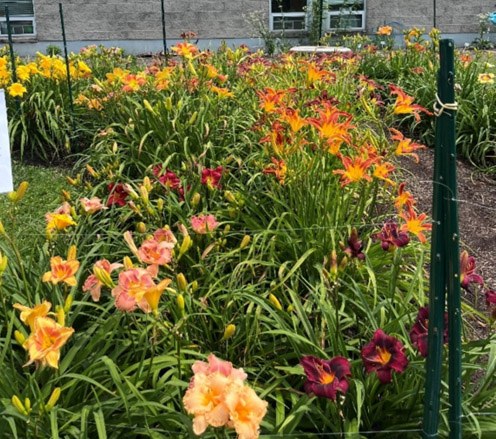
The Daylily Garden is part of the Donohoe Demonstration, located in Greensburg, PA. There are different garden areas that Master Gardeners (MG) maintain to share with the community in Westmoreland County. Post-pandemic, two MGs became involved with rejuvenating the daylily plot, which the deer had been bedding down in during the pandemic. The Daylily Garden is about 200 square feet in size. Increasing deer pressure over the past few gardening seasons led to investigating options to protect the daylilies, other than by chemical means. A physical deterrent was needed, and in the spring of 2023, a fishing line deer fence was installed.
2nd place: Allegheny – South Park Learning Garden
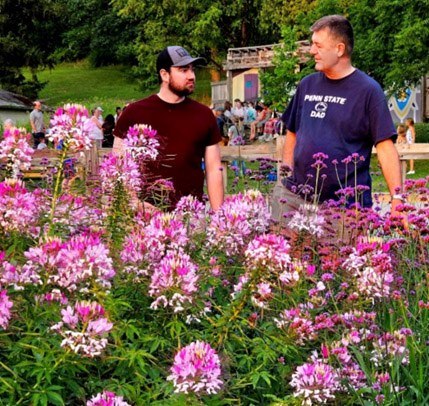
A team of Allegheny County Master Gardeners has reimagined and relocated the demonstration garden within Allegheny County's South Park to better inspire, engage, and educate gardeners, children, and families of Southwestern Pennsylvania. South Park encompasses more than 2,000 acreshosts more resident visits than any other Allegheny County park.* Now located within an accessible site that includes a community theatre and children's outdoor stage, and adjacent to a children's playground, South Park Learning Garden's mission is to serve as a horticultural destination for researchbased education, environmental stewardship, and inspiration. Goals of the new garden are to:
- Demonstrate, educate, and promote horticultural knowledge and environmental stewardship
- Promote a park-like, ecologically minded aesthetic in keeping with Paul Riis' vision (original 1927 designer of South Park)
- Provide ideas, takeaways, and inspirations that homeowners can implement in their own gardens
- Create a connection with South Park Theatre
- Consider children in the design and development of the site
The design team surveyed their target audience (which includes home gardeners, park visitors, children, and families) to learn their interests:
- Deer resistance and perennials (primary interests)
- Native plants, birds, wildlife, and pollinators (secondary interests)
- Year-round beauty, color, and herbs
- A desire to engage with master gardeners
- Multi-use of the space for activities such as yoga, meditation, board games, and presentations
To conceptualize and develop the new garden, the design team worked with the Allegheny County Parks Foundation, county employees, Friends of South Park, theatre management, Master Gardeners who volunteer at the garden, a local garden center, and a local hardware store. These strong relationships continue to grow and provide support for ongoing garden development, which will expand demonstration garden areas, improve pedestrian and traffic safety, and mitigate stormwater runoff. *Allegheny County Parks Foundation, Understanding Our Park User Survey, 2022 Survey Findings
3rd place: Delaware – Reviving the Demonstration Container Gardens at Smedley Park
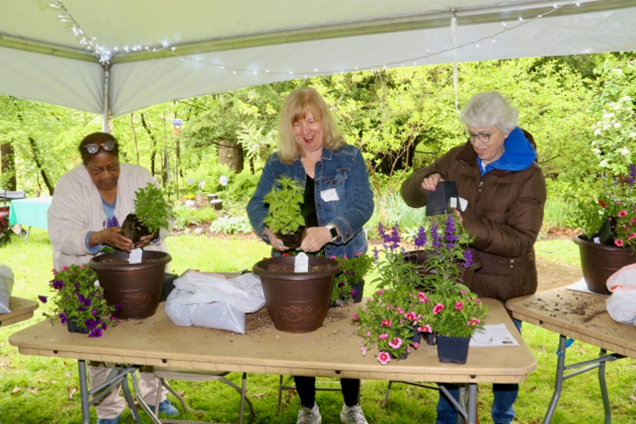
Five people from the Delaware County Master Gardener Class of 2021 chose as their final project the task of updating and expanding the demonstration container gardens on the grounds of the Penn State Extension offices at Smedley Park. Our plans needed to demonstrate proper planting design, multiseasonal functionality, and creative ways to use containers to enhance a home or garden space. The target audience for the ongoing project includes the many Master Gardeners who utilize the grounds, community organizations (Scouts, garden clubs, 4H groups and others) that hold programs in the Environmental Center on site, Delaware County residents who use the walking and bike trails, visitors on local garden tours, and the many community members who attend our annual Spring and Fall festivals. Our primary partners in the first year were our Master Gardener colleagues who maintain the six additional demonstration gardens at Smedley Park, as well as those who manage the Extension Speakers Bureau. In year three we are partnering with the Wallingford Swarthmore Community Classes to bring container gardening knowledge to residents of the local school district. Our project goals were two-fold: first, to replace a few old and worn container gardens at the site, and second, to showcase the many possibilities of container gardening for homeowners. For our first season, we increased the number of containers to twelve, and focused on demonstrating: - various container types, including pots, cans, and bags - using containers in challenging growing conditions - combining perennials, edible plants, and annuals in containers -container gardening on a limited budget - adapting containers for year-round use, and - a self-contained water garden. In both the 2022 and 2023 growing seasons, we have demonstrated innovative plant combinations and growing mediums, and have received many compliments from fellow Master Gardeners and event attendees.
Innovative Projects
1st place: Centre – POLLINATORS! The Musical
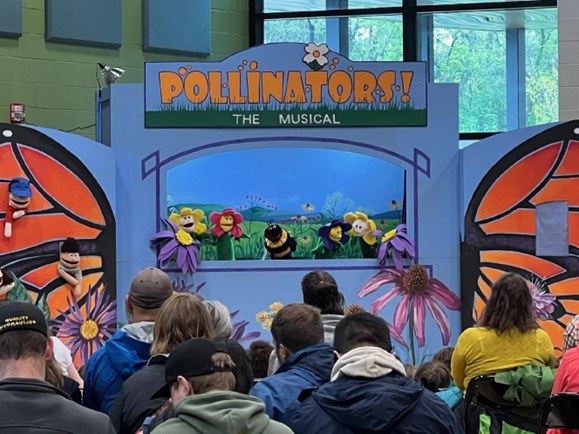
With this presentation, our goal was to introduce critical concepts of pollinator behavior and life cycles, using the medium of musical theatre to present information in an entertaining and memorable way that is accessible to all learning styles. Through relatable, humorous, and scientifically accurate songs and dialogue, audience members learn to appreciate, rather than to fear, our pollinator friends. Although many performances have been staged for children, the show was designed to appeal to all ages. The pre-recorded soundtrack allows for maximum flexibility of performers and venues. Video clip.
Performances have ranged from stand-alone shows to main stage events, including:
- Pollination Celebration at H.O. Smith Arboretum, summer 2022. Sponsored by the Center for Pollinator Research at Penn State, the outdoor, family-friendly event attracted attendees of all ages.
- Monarchs at the Marsh, Millbrook Marsh, autumn 2022. This event geared towards families included two performances of the musical, along with monarch tagging and other educational outreach.
- Spring Creek Elementary Pollination Fest 2023, spring 2023. The school-wide festival also included educational outreach activities, a native plant giveaway, a community art project, and the installation of a new school pollinator garden.
- 2023 International Conference for Pollinator Health, Biology and Policy at Penn State University. The musical was performed during the opening reception of the conference, which brought together individuals from universities, government agencies, industry, non-profit organizations, and stakeholder groups.
- POLLINATORS! The Musical, spring 2024. Every 2nd and 3rd grade class from all nine elementary schools in the State College Area School District was bussed to the State College High School auditorium for performances.
Partner Organizations: The Center for Pollinator Research at Penn State, State College Area School District, Millbrook Marsh Nature Center, The H.O. Smith Arboretum at Penn State.
2nd place: Beaver – Environmental Field Studies
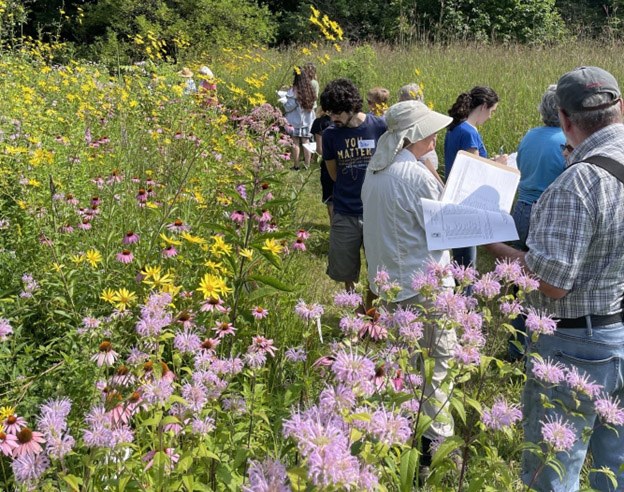
The Environmental Field Studies (EFS) program was created three years ago with the goal of bringing education about our natural world to outdoor, topic-relevant settings where attendees can learn to make ecologically beneficial gardening choices. Participants have overwhelmingly responded to this format to more fully appreciate the complex interrelationships in the natural world and develop skills they can apply for the benefit of their properties, communities and our collective environment. To accomplish this goal, we developed seven hands-on sessions focusing on identifying certain plants and learning how these plants interact with the natural ecosystem. Five of these sessions (Ephemerals, Ferns, Common Trees of PA, Pollinators, Meadows) focus on the positive role of native plants in our natural environment. For these native plants to thrive, they must be free of competition from invasive species. Because of this, we include two sessions addressing both early and late season invasives species, how to identify them, and management strategies for each. These sessions are available to adult community members interested in land stewardship, nature, and biodiversity and are promoted in partnership with other community organizations. Session locations vary according to the subject matter presented, and include a local parks and properties owned by Master Gardeners. These sites provided sheltered areas for instruction, plants appropriate for that session, and accommodations for participants with mobility issues. Using community outdoor locations with interactive experiential lessons is an innovative way to accomplish our goals and support the MG Program's Mission Statement promoting educational activities that focus on environmental stewardship.
3rd place (Tie): Fayette – Wild About Bugs
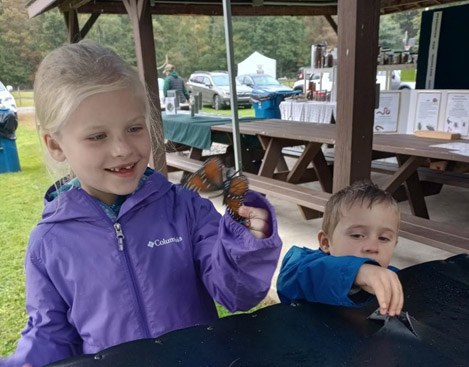
This program was first developed for our Fayette County Conservation District's Wild About Nature Workshop, an event held yearly for our area youth and has since expanded to several other events. The goal of our "Wild About Bugs" is to send a positive message to children and show them just how important the little creatures in our world are. This is a fun, hands on program and it encourages the children to interact and ask questions with the Master Gardeners. The participants are first asked to put their hand in an occluded wooden box that is filled with realistic bugs, worms, and spiders. Then they match their "find" to colorful boards that have pictures and informational tidbits relating to insects, worms, etc. The Master Gardeners engage the children in conversation and explain why the insect or worm they found in the box have important roles to play in our ecosystems and how humans depend on them for survival. This information is tailored to the child's interest, their age group and their attention span. Children in strollers all the way up to teenagers have participated with an added plus of their parents getting involved and asking questions as well. In addition, the children get to pick out an insect sticker to wear and they get to make a headband with the bug of their choice that reads, "I am Wild About Insects!". Last year, our Fayette County Master Gardeners presented this activity for the Conservation District, twice for the children's programs during the Fayette County Fair, the Mountain Watershed Association Festival, each of these events held great children/parent participation and outreach.
3rd place (Tie): Butler – Zelie's Summer Camp: Where History and Gardening Meet!
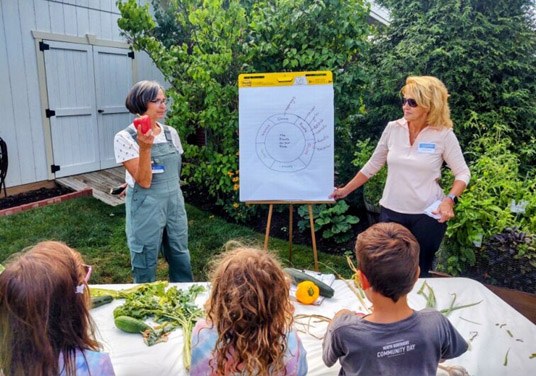
The fusion of local history and horticultural science resulted in an engaging summer camp for young gardeners kindergarten through 5th grade. This innovative project was a collaborative partnership between Penn State Extension Master Gardeners of Butler County and the Zelienople Historical Society. Conducted at the Historical Passavant House and Garden at 243 South Main Street Zelienople, PA, June 13, 21, 27, and August 8, 2023, this camp offered children and parents discussions about the history of Zelienople and hands-on gardening activities specific to the historical theme of the Passavant House and Garden. Mrs. Zelie Passavant was the matriarch of Zelienople's founding family. Zelie's personal correspondence provided first person documentation and insight into her activities in the vegetable, herb, and flower gardens at her home, the Historical Passavant House now a museum operated by the Zelienople Historical Society. Her writings from the early 1800s became the inspiration and springboard for a children's summer camp with lessons in history and horticulture. The project objectives were to: establish a collaborative relationship between Historical Society members and Master Gardeners and create an age-appropriate, enduring curriculum that exposed children and parents to local history through historical and current science-based gardening practices. The goal was to engage learners in the age-appropriate application of local history through the examination of Zelie Passavant's correspondence, tour of her home, and exploration of her gardens through basic horticultural science practices. The outcomes were the measurements of Historical Society members' and Master Gardeners' participation; and children's and parents' satisfaction with, and application of the camp learning activities. This may be the first collaboration between a historical society and Master Gardeners that resulted in an age-appropriate, replicable summer camp.
Special Needs
1st place: Erie – Club Erie Participation at BEST Garden
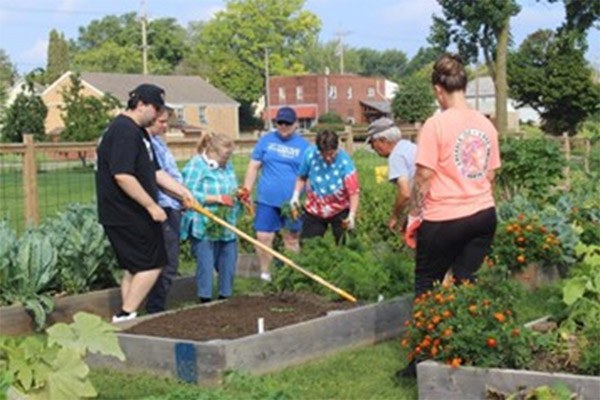
Our project has been to provide knowledge of and accessibility to vegetable and flower gardening to adults with intellectual disabilities. The Erie County Master Gardeners have partnered with the BEST (Bayfront East Side Taskforce) community gardens for over a decade, and as an outgrowth of this, we were able to partner with Club Erie. Club Erie is a community-based service that is part of the Gertrude Barber Center. Club Erie's purpose is to help adults with intellectual disabilities acquire, maintain, and improve skills while accessing their community, building friendships, and having fun. Our goal was to introduce and educate the members and staff of Club Erie on the basics of gardening and to provide it in a friendly and social atmosphere. We meet weekly with them for approximately 3 to 4 hours. We start each week with a tour of their raised beds and discuss and educate them on what is going on with their plants. With the Guidance of the Master Gardeners, they plant, maintain, and harvest their produce. They determine what they want to grow, and we provide the plants or seeds. In the current year, they are starting some of their own plants from seed. They currently work with ten four-byeight-foot raised beds. With time and patience, we have seen their interest expand to flowers, and this past year, they even planted the pollinator garden at the BEST community garden. We wanted to take some of the mystery out of where their food comes from and to instill confidence in their ability to grow their own food. Many of the Club Erie members will return year after year, and we find many of them have started gardens at their residences.
2nd place: Lehigh/Northampton – Community Healing Garden of Lehigh Valley Hospital-Muhlenberg Campus
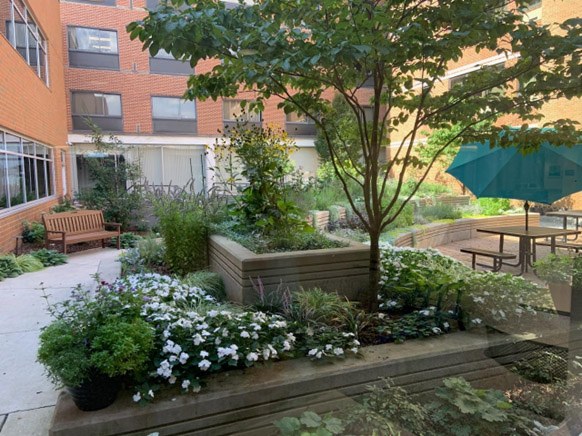
To transform a barren but useful space into a unique, cutting-edge garden oasis in an easily accessible open-air hospital courtyard. The project seeks to engage healthcare staff, visitors, patients, and community to reap the benefits of nature through a therapeutic garden design. The garden's location in this courtyard was designed many years ago for patients undergoing physical rehabilitation at the hospital. A couple of plants were present before the Master Gardeners designed a new garden plan. Positive attributes of the space include accessibility, safe paths, ADA compliant, wheelchair height large raised bed, benches, umbrellas, and other unplanted landscape beds. All it needed was the right plants in the right place to make this ugly courtyard into a beautiful garden. Presently, this garden is primarily for passive enjoyment by staff, patients, and visitors.
Goals:
- to bring peace and comfort to staff, visitors, and family through a therapeutic garden.
- to grow native plants to support pollinators and restore organic matter to soil.
- to teach staff about the maintenance of plants and the benefits of this garden
- Master Gardeners to hold mini-garden workshops for staff on various garden topics.
Potential future use: This garden could easily incorporate the practice of horticulture therapy with patients as the 95 ft raised garden bed is wheelchair height and it is presently planted with herbs and flowers that the early Moravians once grew. It is modeled after the 1752 (Moravian) Apothecary garden located in Bethlehem, Pa. Partner organizations: LVHN ground maintenance and technical staff Ladies Auxiliary of LVHN Muhlenberg Crystal Signatures- crystal fountain design Pharo Garden Center Bethlehem Compost Center Lehigh Valley Rhododendron Society Historic Bethlehem Museum and Sites Moravian Archives.
Workshops
1st place: Elk/Cameron – Seeds of Knowledge: Presentation Outreach Campaign
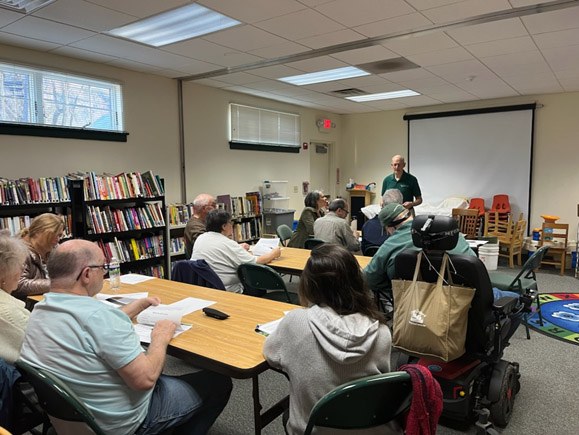
Target Audience: Home Gardeners, Community members interested in home gardening, Master Gardener Trainees, Master Gardeners
Goals: The main goal is to increase learning, to provide support, and to give inspiration for home gardeners, community folks interested in home gardening, Master Gardeners, and Master Gardener Trainees through formal presentations, workshops, and displays as well as informational hand-outs and pamphlets provided by the Penn State Master Gardener program. Confidence gained will lead to an increase in self-sufficiency, food supply as well as "productive" leisure activity and awareness on how to make an impact on climate issues. This goal has been challenging for our county. With over 35,000 residents, our MG membership numbers are small per capita. As well, we have experienced 2 separate occasions where the position of Master Gardener Coordinator has been vacant. Despite that, we have had some very knowledgeable and energetic leaders.
Location: Elk, Cameron, and McKean counties; at libraries, garden clubs, farmer's markets, fairs, community organizations, church grounds, and community festivals.
Timeline: Beginning of the 2023 Master Gardener program year until the present.
Partner Organizations: Libraries: St. Marys, Ridgway, Bradford, Emporium Farmers' Markets: Ridgway, Fox Twp., St. Marys, Johnsonburg, Cameron Co. Chamber of Commerce: Ridgway, Emporium, St. Marys; Johnsonburg Community Trust Other: St. Marys Catholic Church, Elk Co. Fair Board, Kane Garden Club, Bennett's Valley, Ridgway & Johnsonburg Senior Centers, Keller's Greenhouse, Western PA. Conservancy, Elk County Conservation District, & Tractor Supply.
Youth Programs
1st place: Westmoreland – Formula for Success: Poison Prevention Program
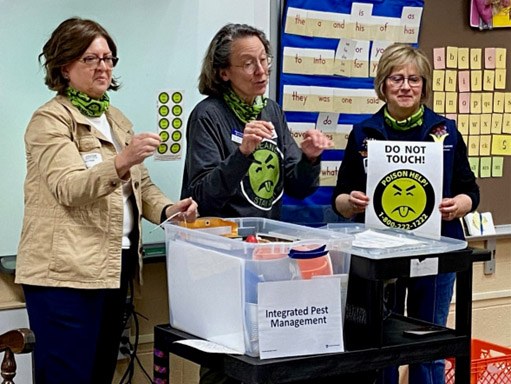
Our formula for success was:
- Start early (October)
- Recruit a large, enthusiastic team of Master Gardeners (MG)
- Communicate clearly and meet regularly with the team (at least monthly)
- Engage all members of the team
- Set deadlines and goals
- Provide training and mentoring to the team members
- Have fun!
The target audience was all first-grade students in the county and their teachers and aides. Our goal was to present half-hour, face-to-face programs in the classrooms to engage, entertain, and primarily educate first graders on how they can help prevent poisonings in their homes. Secondary audiences were the extended families of these students and the ancillary staff and teachers at the elementary schools.
In 2023-2024, our Poison Prevention Program (PPP) team traveled to 16 school districts throughout the 1,036 square miles of Westmoreland County. We presented to 37 schools with 2198 first-grade students. A total of 123 presentations were given.
Master Gardeners visited the schools in pairs and often included an extra MG observer/trainee for mentoring/training. We partnered with the schools, teachers, and administrative staff to find the best days and times for them to host us. Investing in "Mr. Yuk" t-shirts for all presenters made our presence stand out in the schools. We also wore "Mr. Yuk" gaiters. Midway through the planning cycle, the PPP team met to count out student packets for the schools. We coined it our "packet party" and celebrated with pizza and snacks.
2nd place: Crawford – Master Gardener Ag Literacy Program Partnership
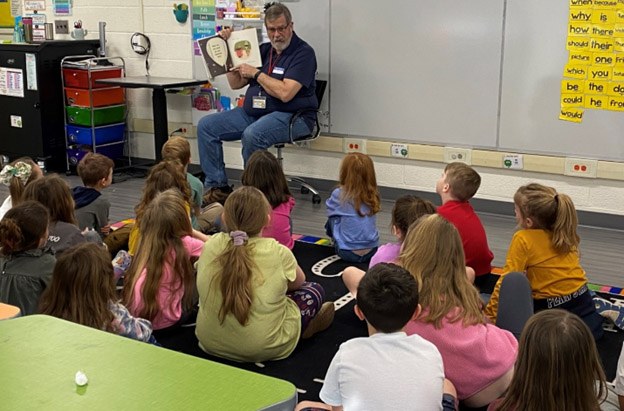
Ag Literacy is an educational program in partnership with the PA Farm Bureau and PA Friends of Ag Foundation. This program is intended for first grade students in the Crawford County schools and three second grade classrooms also participated.
The goal of the program is to educate young students on the different aspects of agriculture. From various types of farming to learning to grow vegetables; the students learn the importance of how agriculture affects our everyday life.
This year the children learned about growing different vegetables in recyclable containers and experimented with lettuce seed germination. Ag Literacy week is the third week in March of each year. Master Gardener volunteers go into the elementary school classrooms and read "The Agricultural Book of the Year." The program also includes an activity that goes along with the book and is completed by the students after the discussion of the book's content. The book that we read this year was Anywhere Farm by Phyllis Root and illustrated by G. Brian Karas. Our hands-on activity was to wet a cotton ball, sprinkle it with lettuce seeds, and put it in a baggie and then students hung it up in a sunny window on a string with a clothespin.
Additionally, the teachers were able to access a website for resources to extend the subject of agriculture in their classrooms. When the teachers access this website, they will discover excellent activities in the areas of Math, Science, English, and Language Arts. The book is then presented to the teacher for the classroom library. The newest elementary school is in downtown Meadville. These students learned about horticulture and previously had very little exposure to agriculture. Each year, not only are the students excited about the agriculture topic, but so are the Master Gardener volunteers!
3rd place: Butler – Ehrman Crest Elementary Garden Club
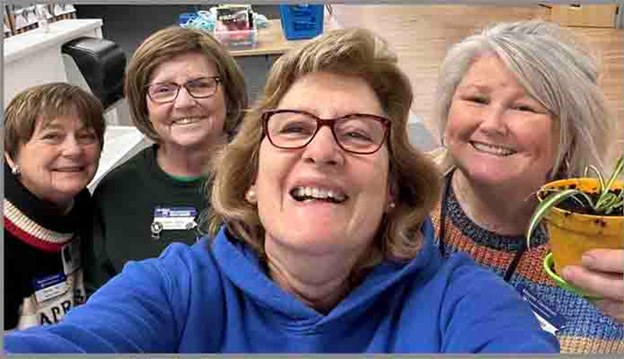
Master Gardeners offer a monthly Garden Club for twenty fourth-graders at a local elementary school during the school year; we meet immediately after school dismissal at the elementary school and parents provide dismissal transportation. Garden Club runs October through May, from 3:30 p.m. to 5:00 p.m. This is our eighth year and second school for the program. Partnering with the school, applications are sent to every fourth grader; the first 20 students to respond are invited to participate. Due to overwhelming interest, responses are time/date stamped by the school and lists of student respondents are given to the project chairperson.
Our goal is to foster an interest in plants and gardens while exposing the students to new experiences and teaching different subjects with research based information.

